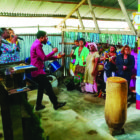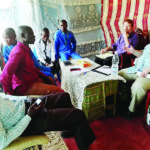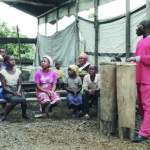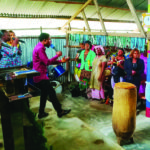
Nov 26, 2018
By Clinton R. Brown
Executive Director Seventh Day Baptist Missionary Society
You can experience quite a variety of worship styles due to regional preferences or the importation of culture from other countries if you visit some of the different Seventh Day Baptist congregations in the USA & Canada. Being a westerner, I was somewhat naive to the variety of cultures also to be discovered on the African continent. Many people, even some Africans, presume that the majority on that continent have similar cultural practices and preferences. I soon discovered that there also can be quite a variation there as well, depending upon the regional heritage and how it has been influenced by European colonization or immigration from other nations.
However, usually when I am visiting groups that are in a general region and share some historical heritage and language connections, they tend to have more similarities in their practices and worship styles. This is why I found the variations particularly interesting on my June visit to Africa this year.
I had been saving the last of our known French language countries in Africa to visit with Bill Shobe, pastor of the Dodge Center SDB Church in Minnesota. Many years ago Bill studied French and spent some time in Paris where he experienced a life-changing encounter with Christ that altered his destiny. Bill has miraculously retained his ability to speak conversational French without regular practice and was excited about the opportunity to put this talent to use by accompanying me to Rwanda, Ivory Coast, and the Democratic Republic of the Congo (the DRC).
These countries are not very divergent in their relation to the equator and all are influenced by European colonization and use French as an official language. Having been to Rwanda
on a previous trip, I anticipated correctly that our congregations just over the border in the DRC were rather formal in their worship expression. The leaders wear western style suits and they kneel to pray in services and in home settings. They tend to have an exuberant, but orderly service with a schedule. And much of their music is translations of traditional western or European hymns sung a cappella or accompanied by simple instruments.
When we went to visit in Kinshasa in western DRC, I expected to experience a similar church culture, but was interested to find that they were a bit more enthusiastic in their services. They had adopted big hats for the ladies, and hand raising during their praise music time. The songs were usually local language or French-translated modern choruses. The accompaniment was mouth blown police whistles by several of the women, tambourines, keyboard, and even an electric guitar.
After that you would expect the final stop in Abidjan, Ivory Coast, to be something like one or the other or somewhere in between. Actually, to me they were in a separate category altogether. Their worship centered around adapting West African traditional or tribal dance to choreographed praise numbers, free form congregational dance, and dramatizations of Bible stories or modern skits to illustrate biblical principles.
Individually and together these were beautiful examples to me of Christ followers worshiping God in ways that were meaningful to them. Had I videoed and shown each how others were worshipping they would have likely asked, “Are those Africans?!?” To which I would have said, “Yes, but more importantly, those are Christians.”
Let the people praise thee, O God; let all the people praise thee.
—Psalm 67:5




